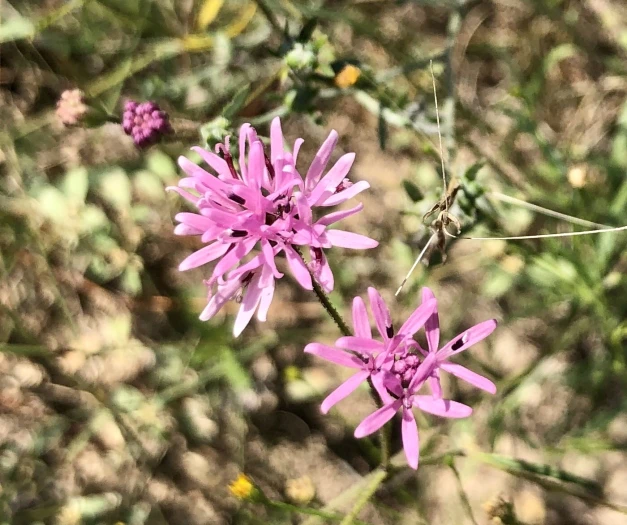Rose Palafox
(Palafoxia rosea)
Rose Palafox (Palafoxia rosea)
/
/

© Sue Ann Kendall
CC BY 4.0
Image By:
© Sue Ann Kendall
Recorded By:
Copyright:
CC BY 4.0
Copyright Notice:
Photo by: © Sue Ann Kendall | License Type: CC BY 4.0 | License URL: http://creativecommons.org/licenses/by/4.0/ | Uploader: sunasak | Publisher: iNaturalist |

























Estimated Native Range
Climate Requirements
| • Precipitation | 13" - 51" |
| • High Temp. | 89°F - 100°F |
| • Low Temp. | 11°F - 52°F |
Summary
Palafoxia rosea, commonly known as Rose Palafox, is an annual herb that is native to the sandy plains and dunes of the southwestern United States and northern Mexico, particularly thriving in arid desert environments and rangelands. It typically grows to a height of 12-24 inches with an erect, slender stem that is glandular and hairy in the upper parts. The leaves are lanceolate, or spear-shaped, and the plant produces reddish to pink ray florets that bloom in late summer to fall, attracting bees, butterflies, and birds with their nectar.
Rose Palafox is valued for its drought tolerance and ability to thrive in poor, sandy soils, making it an excellent choice for xeriscaping and naturalistic plantings in arid regions. Its tendency to self-sow makes it a low-maintenance option for gardeners seeking to establish a wildflower meadow or to add color to challenging sites. In cultivation, it requires minimal water once established, prefers full sun, and is well-suited to sandy or well-drained soils. While it is not commonly afflicted by diseases, it can occasionally suffer from root rot if overwatered or planted in poorly drained soils.CC BY-SA 4.0
Rose Palafox is valued for its drought tolerance and ability to thrive in poor, sandy soils, making it an excellent choice for xeriscaping and naturalistic plantings in arid regions. Its tendency to self-sow makes it a low-maintenance option for gardeners seeking to establish a wildflower meadow or to add color to challenging sites. In cultivation, it requires minimal water once established, prefers full sun, and is well-suited to sandy or well-drained soils. While it is not commonly afflicted by diseases, it can occasionally suffer from root rot if overwatered or planted in poorly drained soils.CC BY-SA 4.0
Plant Description
- Plant Type: Herb
- Height: 1-3 feet
- Width: 1-2 feet
- Growth Rate: Moderate
- Flower Color: Pink, White
- Flowering Season: Spring, Summer, Fall
- Leaf Retention:
Growth Requirements
- Sun: Full Sun
- Water: Low
- Drainage: Fast, Medium, Slow
Common Uses
Butterfly Garden, Drought Tolerant, Low Maintenance
Natural Habitat
Native to sandy plains and dunes of the southwestern United States and northern Mexico, particularly in arid environments and rangelands
Other Names
Common Names: Rosy Palafox, Rose Palafox
Scientific Names: Palafoxia rosea, Othake macrolepis, Othake roseum, Othake roseum var. roseum, Othake texanum var. macrolepis, Palafoxia macrolepis, Palafoxia rosea var. ambigua, Palafoxia rosea var. macrolepis, Palafoxia texana var. macrolepis
GBIF Accepted Name: Palafoxia rosea